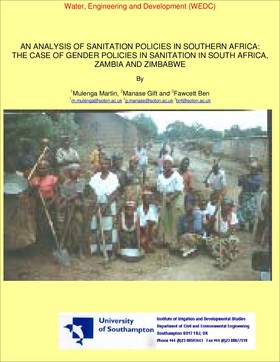An Analysis of Sanitation Policies in Southern Africa: the case of gender policies in sanitation in South Africa, Zambia and Zimbabwe

Access to sanitary means of human excreta, solid waste and wastewater disposal is regarded as a universal need and, indeed a basic human right, which is key to human development and poverty alleviation. It is in the light of the importance of sanitation to the well being of society that national governments, NGOs and international organisations have put a lot of effort to improve sanitation in the past more than twenty years. Yet, despite all these efforts a report by the WHO and UNICEF (2000) presents the “shameful” state of the world’s sanitation situation. According to the report 2.4 billion people (40% of humanity) had no access to sanitary means of excreta disposal at the end of the 20th century while 4 billion did not have access to sanitary means of wastewater disposal. Consequently 4 billion cases of diarrhoea were reported each year between 1990 and 2000, resulting in an annual toll of 2.2 million deaths.
Cite this publication
Available at https://www.iied.org/g02219